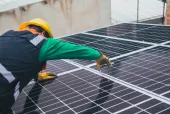
Greenko obtains concessions to build wind farm and hydro assets
The project is set to be built in the Indian state of Karnataka.
Greenko (GKO), a generator of energy from renewable sources and a supplier to the mainstream Indian energy market, announces that it has secured concessions from the Karnataka State Government to build one 300 MW wind farm and a number of new hydro assets with an aggregate capacity of 50MW. The concessions are held by Fortune 5 Limited, a wholly-owned subsidiary of the Group. These concessions take Greenko’s portfolio of assets, both operational and in development, to 978MW. The portfolio is diversified both geographically and by asset class. Taking account of the new concessions announced today, the portfolio consists of 462MW of hydro, 365MW of wind, 97MW of natural gas and 54MW of biomass.
Anil Chalamalasetty, CEO and MD of Greenko, said: “The energy market for conventional power in India is characterised by huge demand, complex fuel supply issues and volatile merchant prices combined with environmental and social permitting challenges. The Greenko model is distinctly different. Our small hydro and wind assets are not subject to fuel risk and benefit from long-term, fixed margin power off-take agreements which are not available to conventional power generators. These off-take agreements allow us to secure minimum returns over the life of the asset and capture superior returns when the market conditions are particularly favourable. We strive to achieve this for our shareholders and customers whilst generating power responsibly.”
He added, “Wind power is a crucial part of the Group’s plans to create a balanced portfolio of clean energy producing assets and this substantial 300MW addition is further evidence of our progress towards our target 1GW operational portfolio by 2015. Hydro remains a key asset class and the 50MW of aggregate concessions are a welcome addition to the portfolio in what is a proven and reliable area of our business.”
Wind Concession
The 300MW wind farm is expected to be built in two phases. Phase 1 (100MW) is expected to be complete and operational in 15 months. Phase 2 (200MW) is expected to be completed and operational in three years. Once operational, the asset will supply power to the State of Karnataka on a 10 year Power Purchase Agreement. It is anticipated that the Company will realise 4.2Rs/kWh net.
Located in the South Western Indian state of Karnataka, the site enjoys favourable environmental conditions. Greenko is highly selective when purchasing land and securing permits for wind farms and in keeping with the approach taken when assessing the Company’s 65MW wind asset in Maharashtra, which is currently under construction, Greenko has been actively assessing the Karnataka site over a two year period. Using numerous masts and anemometers, which are used for measuring wind speed, placed at various heights the data collected shows capacity factors in excess of 30 per cent with a 90 per cent confidence factor. The Directors believe these to be significantly above the average capacity factors experienced in the State of Karnataka.
Hydro Concessions
Greenko has also secured concessions for a number of small, run-of-river hydro power plants with an aggregate capacity of 50 MW. The sites, situated on the River Badhra in South Karnataka close to existing Greenko operating assets, are in an early stage of development. All the necessary permits are expected to be obtained in the next 12 months, with construction lasting 24 months thereafter.
The Company is evaluating a large number of prospective sites which may be suitable for further small hydro assets and remains in discussions with a number of strategic partners to ensure access to the best technologies and financing opportunities on the market.
Outlook
Commenting on the Indian energy market and the opportunities for Greenko, Mr. Chalamalasetty added, “Sustainability is the cornerstone of our business. We focus on the sustainability of assets, technology, financial returns and the environment. Whilst the market conditions in certain other countries around the world make sustainable energy generation expensive and commercially challenging, the unusual dynamics in the Indian market make the industry both economically and socially attractive.”
The Company will announce its financial results for the year ended 31 March 2011 in due course. Whilst the audit has not yet been completed, the results are expected to be in line with market expectations.













 Advertise
Advertise











